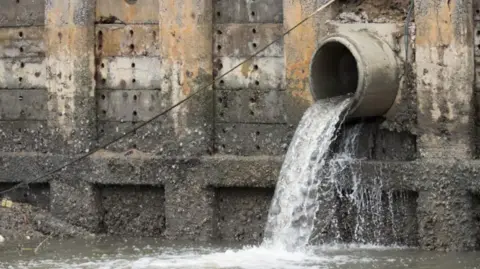Rise in sewage spills prompts investment concerns
 Getty Images
Getty ImagesConcerns have been raised about infrastructure investment following an increase in the amount of sewage pumped into rivers and the sea in north Norfolk last year.
Untreated waste water was released in the east of England for almost 500,000 hours – a 64% increase on 2023 – with Anglian Water promising "transformational action" to tackle the problem.
Sewage flowed into the River Stiffkey, near Blakeney, for more than 1,500 hours, while beaches at West Runton, East Runton and Mundesley, all of which have Blue Flag status for excellent water quality, were near overflow pipes that had increased spills.
North Norfolk Lib Dem MP Steffan Aquarone said the Environment Agency's data was "disgraceful".
 Getty Images
Getty ImagesHe said: "The people of north Norfolk deserve so much better than filthy water and polluted oceans.
"I'll keep on demanding that Anglian Water increase their investment in the area and that the money goes towards urgently improving our rural and coastal sewage infrastructure."
The releases came from storm overflows, which dump untreated sewage into rivers and the sea, usually during periods of heavy rain, to stop sewers backing up and flooding.
According to the Local Democracy Reporting Service, more than 500 hours of spills came from Cromer's main sewage works out in the North Sea, off the coast of West Runton.
It had 91 spills, while another pipe on West Runton beach had 116 hours of spills during 32 incidents.
One mile (about 1.5km) along the coast, East Runton beach regained its Blue Flag status last summer but was closed for several days in June due to sewage pollution.
'Extreme weather'
At Mundesley, an outfall off the coast had 87 spills lasting for a total of 371 hours and a pipe on the beach had two spills totalling nearly seven hours.
North Norfolk District Council leader Tim Adams said the figures "proved there is still an awful of infrastructure work needed".
Anglian Water has said it would spend £1bn to tackle spills.
"We know our customers will be disappointed to see an increase in our storm overflow data this year," a spokeswoman said.
"This is largely reflective of the extreme weather and persistent flooding we saw across our region in the first part of 2024, which accounted for nearly 50% of our spills.
"We have promised transformational action – because we know our climate is going to keep changing, so we have to find better ways of dealing with extreme rainfall."
Follow Norfolk news on BBC Sounds, Facebook, Instagram and X.
